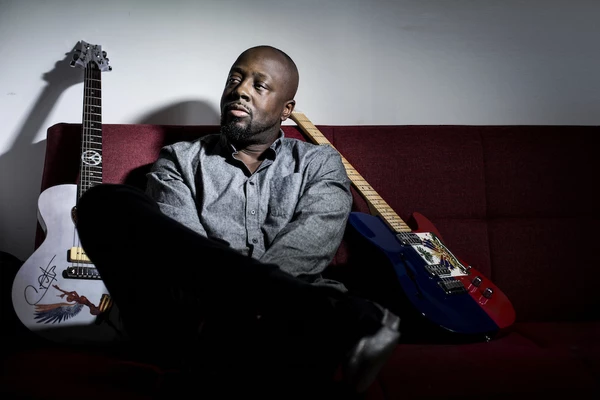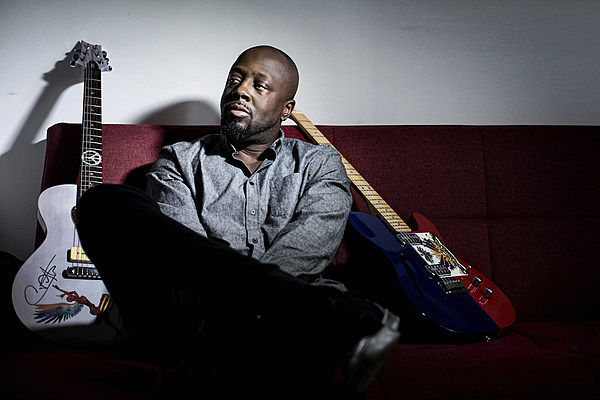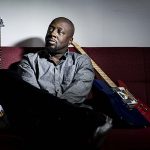‘Music Saved My Life’ Wyclef Talks Young Thug and Refugees in the Age of Trump

It’s been twenty years since Wyclef Jean’s multiplatinum first album The Carnival. The Haiti-born, New Jersey-raised instrumentalist was one of the first artists in hip-hop to merge reggae, calypso, neo-soul, and pop—and he’s been highly successful at it, to the tune of more than 100 million albums and 20 million singles sold worldwide over the course of his career.
Clef has been making music for more than half his life; after coming to America at ten, his first demo was with Kurtis Blow when he was fifteen. He was cast in his first music video at seventeen (that’s Wyclef as an extra on the upright bass at the beginning of Eric B. & Rakim‘s “Don’t Sweat the Technique.”) He recorded his first record at eighteen (Afrikali’s “Out of the Jungle”) and a year later was sitting in a basement with his friends Prakazrel “Pras” Michél and Lauryn Hill, working on the first Fugees album.
He has written and produced music for Whitney Houston, Beyoncé, Carlos Santana, Shakira, Kanye West, Mary J. Blige and many more. But in 2010, Clef took a break from music to run for President of Haiti. He didn’t win the election, but has remained committed to philanthropy in Haiti.
Now Clef is back with a new album, Carnival III: The Fall and Rise of a Refugee. We got a chance to visit Clef at his new music home, Heads Music, a new independent label run by Madeline Nelson. We talked about his work with the new generation of artists, his latest album, the lingering legacy of the Fugees, and his thoughts on our current President.
The Fugees changed the game—did you know in the beginning that you were onto something big with the group?
No, what I did know was The Fugees had a plan; we said we would not create just music–we would be a movement. A movement is bigger than music, anybody who’s just doing music they come and go. But when you create a movement and people believe in it, it’s gon last forever.
We just wanted something that people naturally cared about, not a gimmick. Anything that came out in our era that was a gimmick is not here anymore. Now if you say The Fugees is coming out with music, I don’t care how old that person is, they like–when? For them, it’s bigger than music it’s like a piece of their body. It’s something they can relate to in their soul.
How does it make you feel when people ask you about The Fugees now?
Think about it, I’ve run for President—so the idea of someone asking about a Fugee record…I still think it’s the greatest thing. Because remember: I ain’t ask for music, I asked for a movement.
So as a producer and as a Fugee member, I’m always down. The good thing about The Fugees is the actual sonics, the astros, have to align. And if they don’t align—y’all just have to live with The Score.
Why did you choose music as a form of expression to share your voice?
From Haiti, I came to America and landed in the projects. I always say my mom replaced the gun with the guitar. The projects are real, my cousins got killed and different things were happening. My dad was a minister, so automatically you’re thrown into the church whether you want to or not and the organ is there.
I loved breakdancing, I loved graffiti art, and then I loved the prospects of instruments. My mother told me I could take all that energy I had and nurture it into something positive. Music was deeper than an expression, if I didn’t do this I’d be killed. There was no middle ground—music saved my life.
You merged genres like salsa and hip-hop early on in your career and now it’s the norm. What made you step out and try out different sounds before it was the trendy thing to do?
In my brain, hip-hop is the culture. I never bought into the idea of somebody saying that hip-hop sounds a certain way. I always looked at hip-hop like people looked at country music–this ain’t going nowhere. It’s endearing and it will always talk about the issues and sonically, though the music will keep changing, the issues will always adjust to the neighborhoods and that ain’t going nowhere.
You’ve worked with Destiny’s Child, Whitney Houston, Kanye West, Mary J. Blige and so many others. How do you figure out how your style will best match with other artists?
I’m a composer first, that means that I create composition like a play. This is like a movie script, I have to figure out who’s going to be the best for this cast? So, we might have three people and I’m thinking, who can sing this “…9-1-1” and not make it feel like a song? Boom—Mary J.
I always see it from the level of composition and who’s going to make it the most believable for the crowd. When I do music for myself, I just express a vibe and whatever that vibe is, I just go with it.
When you made your departure from the music scene you left on a good note—with an extensive catalog. So what made you return to music?
I went away because I wanted to be President of Haiti and I was doing everything on track to become President. If I see 250,000 of my people are under the rubble, how am I gonna be sitting here singing “Hips Don’t Lie?” After I ran for President, I came back to America with a new idea. I said “I’m gonna do music, but the genesis of it has to be based on what I’m one of the best at–which is discovery.” I wanted to come back and combine tech and music.
When I came back I contacted Madeline Nelson, because knew she had worked for Sony at the time and she saw a lot of the technology that was coming through Sony. Madeline was like “I’m going to help you with your tech but I have a small label called Heads Music.” And she said the culture still needs me.
Is there a key for knowing what could resonate with the people—do you know when you have a hot record?
I have a feeling—and guess what? I don’t have a format. Wyclef don’t have a format. It don’t exist. So if someone said they were going to take it to radio, I’d be like let them know that it’s just called “the Wyclef format.” “Beep Me 9-1-1” wasn’t in no format, [Santana’s 1999 hit] “Maria Maria” didn’t have a format.
The format is the people’s format—this is why I love YouTube. Kids can just go out and discover new music, and this, to me, was always how music was supposed to sound.
It’s been 20 years since you released Carnival, what does this album, Carnival III: The Fall and Rise of a Refugee mean to you personally?
It basically means the celebration of sorrow. Through pain, you can find celebration and that’s the whole vibe. This is the closure right here and I’m letting Y’all know it’s okay to celebrate. It’s like okay, ya mans locked up, he in the pin but if you can just get that chance to have that conversation you could cheer him up to let him know that the next appeal is going to be alright.
Little girl sixteen and she’s pregnant feeling like her whole life is over, you can still have that Tupac conversation with her to let her know it’s going to be alright–that’s what it’s about.
What inspired you when creating the new album?
I’m a producer and I know there ain’t nothing that hasn’t been already done before. Now that I’m forty-something, there is a kid named Super Mario and he did a record for Young Thug called “Wyclef Jean,” and when I heard the record [and thought] it sounds like a song on Carnival called, “Diaspora,” so it’s like—wow, there’s a new generation.
Also for me as a producer, sonically, I’ve figured out Logic. I’ve figured out the Native Instruments. I’ve figured out the Fruit Loops, right? But think about it—I did The Score in my basement, so it’s nothing but another patch to me. I was able to build a new drum catalog with modern sonics–[using] the old catalog of 1997. And this is what you have when the Unc meets the nephews. That’s inspiring.
Your music always has some kind of social commentary—what’s the message on this album?
The message on this album is that love and hate can never be friends. Love is going to conquer hate no matter what, it don’t matter if dude got a red flag or a blue flag. At the end of the day if dude got a Haitian flag it’s like they all meet as one.
What made you call this album The Fall and Rise of a Refugee?
Because that’s what it is—it’s the fall and rise. We’re in a world, especially the kids—they get so pressured to have to achieve so much at a certain age. And I want them to know that it’s okay to fall. The philosopher Confucius teaches that it’s not really about the fall, it’s about the rise.
So I wanted to flip it, everybody is always like, “we’re on top, we’re killing it.” And I’m like—nah, the fall and rise, what happens if you sacrifice it all like Job? And you decide you’re going to leave it and then come back. This is what happens.
On your new song “Borrowed Time,” you sing, “These are the days of our lives when we will fall just so we can rise.” When have you fallen?
The Fugees first record—which is called Blunted on Reality. That album tanked, but for us, success would never be measured by a performance that takes place in ten seconds and it’s over. It would always be judged by the course of the marathon. So, that’s basically what I tell people, it makes you stronger. This is what makes you stronger and keeps you going.
If everything has been done—what keeps you motivated creatively? Is there a key to making things fresh for yourself to help you stay inspired?
Originality. You can’t keep discovering yourself—you gotta discover new groups. Forget about me for a second, the amount of new talent on the Carnival III is amazing. When I heard Wavy Kid playing, I said to myself he sounds like a mixture of DarkChild and Teddy Riley—he just happened to be in his twenties. I’m excited about the new cliques.
And this is why the mixtape (The Deluxe Edition of Carnival III) I created is exciting. The whole mixtape is inspired by Kendrick Lamar, inspired Kodak, and you’re going to see one of my favorite joints is with A$AP Ferg.
After so much music about refugees and speaking up for the unheard, how do you feel about where America is now and the politics surrounding immigration?
I always say the cobra starts with the head and anything you do starts with the head. Throughout all of America, you have all kinds of debates on what’s right and what’s wrong. And what we know is wrong is you calling somebody a son of a bitch. You can’t be the leader of a nation and do that because then you’re going to divide the sides.
What I tell people…I urge people to learn as much as you can about what side you’re voting for. In our communities, I don’t think our people know enough about what a Democrat really is and what a Republican really is. And then I think some of our congressmen and mayors that do understand, they ain’t giving the people the information. There is also antics—but we live in a time of information and hip-hop can help inform the people. We have to bring our people to a super awakening.
What is your involvement with Haiti currently—in terms of working with the people?
I’ve been working with small and quiet crews of different people with a lot of money and we’re coming up with a plan. I can’t speak too soon but I’m working with certain private sectors so we can bring jobs to the country.
What has been your biggest accomplishment in the music industry?
I think thus far it’s just the idea of institution. A lot of people say they globalized music but I really globalized music. When I was globalizing, people didn’t even call it that. The Score took it across the waters. I’m able to create something where institutions in the future will listen and dissect these albums.
What’s next for Wyclef Jean?
I am in the process of inventing what will be the first hip-hop guitar. I’m a year and a half away from revealing the first prototype. I didn’t name it or anything yet but it’s coming.
Go to Source
Author: Sharee Hereford
Powered by WPeMatico



